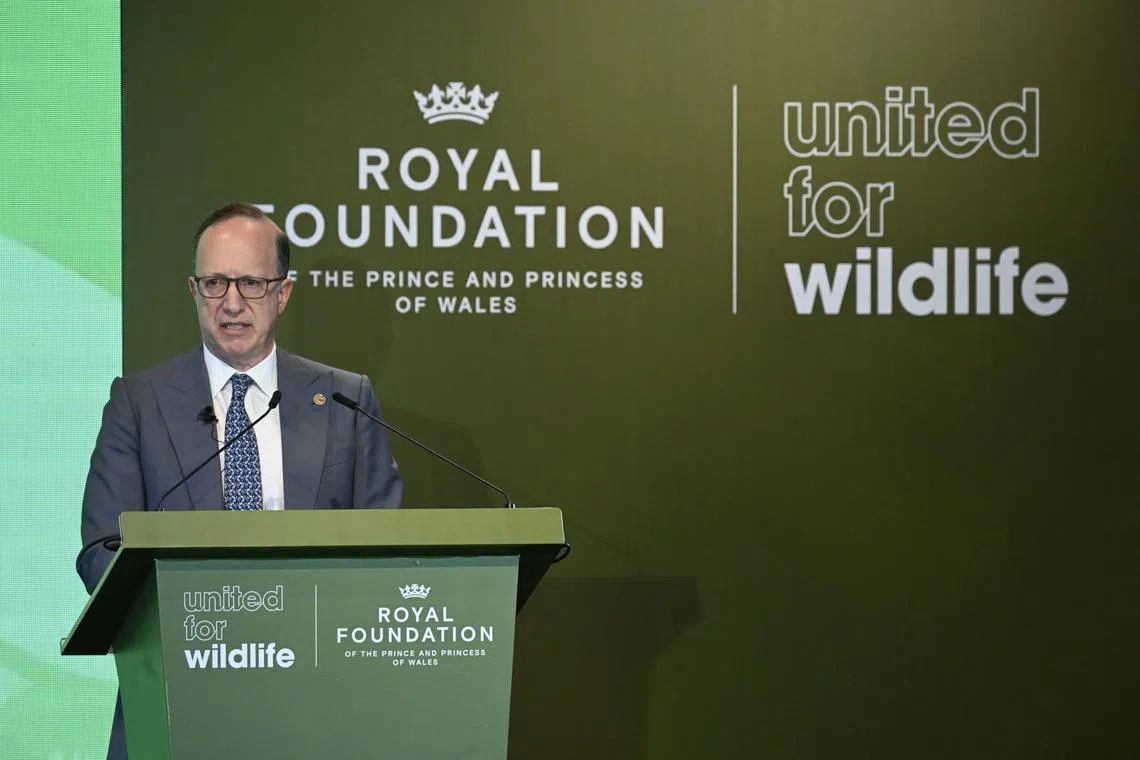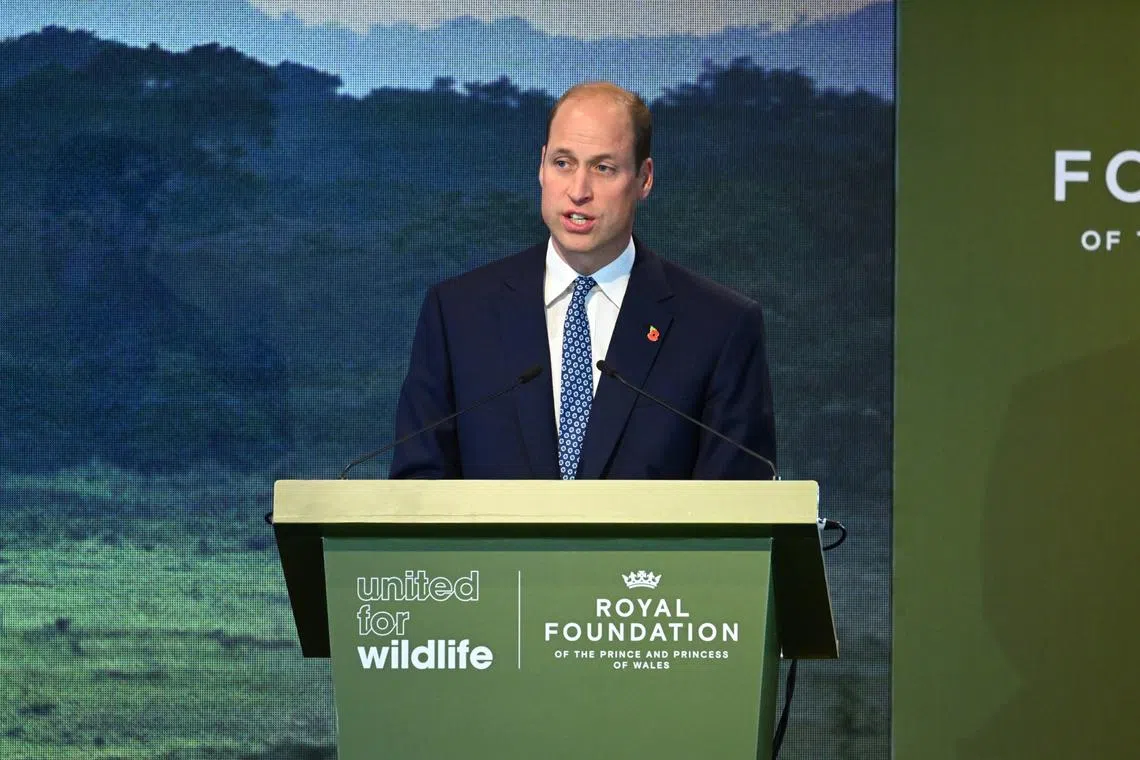S’pore among 7 countries in tie-up to clamp down on financing linked to illegal wildlife trade
Sign up now: Get ST's newsletters delivered to your inbox

United for Wildlife co-chair David Fein noted that illegal wildlife trade often gets lumped together with other types of organised crime.
ST PHOTO: AZMI ATHNI
Follow topic:
SINGAPORE – Seven countries, including Singapore, have agreed to collaborate to clamp down on financial crime which fuels the illegal wildlife trade.
The declaration was unveiled at the United for Wildlife summit at the Gardens by the Bay on Monday. The organisation is an initiative set up by Britain’s Prince William and the Royal Foundation.
Under the declaration, the financial intelligence units of Australia, Canada, New Zealand, South Africa, Singapore, Britain and the United States have announced their support and agreed to a “statement of principles” for a multilateral approach to combating illegal wildlife trade.
The summit focused on the power of international collaboration and shone a spotlight on success stories from South-east Asia, which is estimated to account for up to 25 per cent of global illegal trade. The region is also at the forefront of tackling wildlife crime, with several successful stories from Singapore.
Prince William, who attended the summit, said that the Singaporean authorities have taken “tremendous leadership” in tackling illegal wildlife trade, noting that the Republic had seized about 34kg worth of rhinoceros horns
He added that United for Wildlife will enter a new partnership with Mandai Nature to build on the ongoing work for United for Wildlife’s South-east Asian chapter.
Each chapter, which zeroes in on region-specific issues, allows countries to develop best practices and location-specific solutions.
Since 2016, United for Wildlife has supported 600 investigations, nearly 300 seizures of illegal wildlife products, and trained more than 111,000 people to target and tackle wildlife crime.
A partnership has also been formalised between United for Wildlife and Interpol through a letter of intent pledging to combine their operational expertise and global networks to tackle illegal wildlife trade.
Criminals who engage in illegal wildlife trade often abuse the financial system to hide illegal revenues from wildlife crimes and engage in money laundering.
According to a report released by the Financial Action Task Force in June 2020, an estimated US$7 billion (S$9.4 billion) to US$23 billion of illegal wildlife trade takes place annually.
Speaking to The Straits Times, United for Wildlife co-chair David Fein noted that illegal wildlife trade often gets lumped together with other types of organised crime. For instance, in a case in 2022 in New York City – known as the Kromah case – defendants were charged with trafficking elephant ivory, rhino horns and heroin, along with money laundering, at the same time.
“So there are high levels of convergence of wildlife trafficking with other types of crimes, and if we just leave wildlife crime to conservationists, we’re not going to make much progress,” said Mr Fein.
Yet, countries are busy with other priority crimes, with conservation crime often placed lower on the national radar, he noted.

Prince William, who attended the summit, said that the Singaporean authorities have taken “tremendous leadership” in tackling illegal wildlife trade.
ST PHOTO: AZMI ATHNI
As such, the new multilateral agreement would improve countries’ responses to illegal wildlife trade on national and international scales across the entire ecosystem.
“This would go from following the money to following the traffickers, the trafficked goods and the organised crime. It’s the syndicates that sit above all of it,” he added.
The agreement will enable the countries’ financial units to communicate with one another, trade intelligence and encourage law enforcement to collaborate, said Mr Fein.
The seven countries which are part of the agreement each have different levels of exposure to wildlife trafficking, he noted.
“South Africa is a hugely important source country as it is where many important and protected species reside. Singapore is a very important transit country, being a port for shipping and air transit, while other countries like the United States are important capitals, where the money flow operations take place,” said Mr Fein.
Asked to cite some of the telltale signs of money laundering linked to illegal wildlife trade, he said one could be the geographical flow of the money – from Country A to Country B to Country C, with repeated transactions in the same direction indicating a possible red flag.
Sometimes, shell companies could be set up, or legitimate businesses in certain industries, such as the lawful wildlife trade, to be used to disguise the illicit businesses.
For instance, European eels, which are a protected species, are often disguised as American eels and are traded across countries, he added.
Many of the countries which have signed the collaboration declaration are already cooperating well with one another, such as Singapore with South Africa, said Mr Fein.
But the agreement will boost collaboration and strengthen existing best practices, he added.
Mr Gregory Foo, who is the director of Singapore’s Ministry of Home Affairs’ International Organisations and Security Directorate at the International Cooperation and Partnerships Division, said: “Singapore supports the statement of principles and reaffirms our strong commitment to combating illegal wildlife trade and the laundering of illicit proceeds.”
Highlighting that illegal wildlife trade gravely threatens the planet’s biodiversity and ecosystems, Mr Foo added that Singapore has adopted a “whole-of-government and multi-pronged approach” to detect illicit financial and asset flows linked to illegal wildlife trade.
He pointed out that Singapore’s environment and law enforcement agencies work closely with its financial intelligence unit and the Suspicious Transaction Reporting Office to exchange information, intelligence and coordinate joint operations and training.
“This is coupled with private sector engagement to strengthen detection capabilities and enable timely and effective information sharing,” he added.
United for Wildlife aims to get other countries to sign the declaration, with a priority on countries in South-east Asia and Africa.


